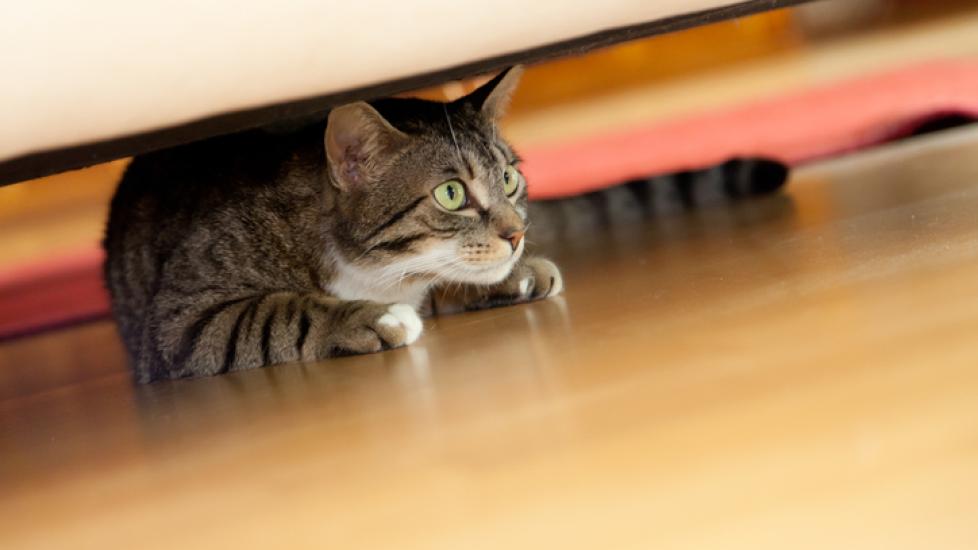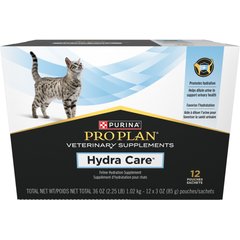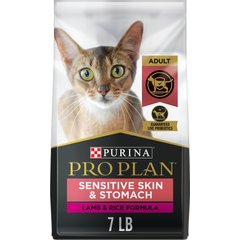5 Things That Stress Out Your Cat
By Paula Fitzsimmons
Sounds and smells we may enjoy or don’t think twice about can make our feline family members miserable. Cats have a heightened sense of smell and hearing that serves their wild counterparts well. But our homes are not the wild.
Nobody can say precisely why your cat reacts to a certain stimulus, mostly because there’s not a lot of scientific research available on this subject. Still, experts agree it’s beneficial to identify sounds and smells that stress out your cat, and make necessary adjustments to your environment. The following are some of the most common irritants for cats.
Thunderstorms and Fireworks
Unexpected loud noises and sudden changes in air pressure likely alert cats to be on guard, says Lauren Demos, president of the American Association of Feline Practitioners. “They can warn of impending situations that may require the cat to fight or take flight.”
A cat's reaction to loud and abrupt noises is an evolutionary response, says Dr. Bruce Kornreich, associate director of the Cornell Feline Health Center at Cornell University in Ithaca, New York. While humans also get startled by sounds, we can easily figure out that the noise won’t harm us, unlike cats. Cats may also equate loud noises with negative experiences, Kornreich says. And sometimes, there’s just no logical explanation for their reaction.
While you can’t control every noise, you can pre-plan for certain situations, such as fireworks and thunderstorms. “I recommend confining your cat to a room where she feels comfortable and away from the noise,” says Adi Hovav, senior feline behavior counselor at the ASPCA Adoption Center in New York. “However, if she’s already found a hiding spot, consider leaving her there, as moving her to another spot may increase her stress.” If you do set up a quiet “sanctuary” room for your cat, make sure she has access to a cat litter box, Hovav adds.
A white noise machine to mask the sound may be useful, too. “Or, offer her some quiet attention in the form of yummy treats or gentle petting,” Hovav says. “Not all cats are going to be comforted by being held if they are frightened or stressed, even if they enjoy being held under normal circumstances, so don’t force your cat if she’s not accepting of this type of attention.”
Cat calming products like compression shirts designed for cats can also be helpful for short periods, as can synthetic pheromone sprays, collars, or diffusers, Demos suggests.
Vet Recommended Health Support
- Douxo S3 CALM Soothing Itchy, Hydrated Skin Dog & Cat Mousse, 5.1-fl oz bottle$28.82Chewy Price
- Purina Pro Plan Veterinary Diets FortiFlora Powder Probiotic Digestive Supplement for Cats, 30 count$30.99Chewy Price
- Purina Pro Plan Veterinary Diets Hydra Care Liver Flavored Liquid Supplement for Cats, 3-oz pouch, case of 12$14.99Chewy Price
- Purina Pro Plan Adult Sensitive Skin & Stomach Lamb & Rice Formula Dry Cat Food, 7-lb bag$28.08Chewy Price
High-Frequency Sounds
Loud and startling thumps, bangs, and clanks aren’t the only noises that can stress cats. High-frequency sounds such as whistling tea kettles and even the sound of our voices can cause anxiety, says Dr. Jill Sackman, head of behavioral medicine service at Blue Pearl Veterinary Partners in various locations in Michigan.
Scientists say cats hear a broad range of sounds, including high-pitched ones. This means cats can hear a lot of sounds we can’t, Kornreich says, such as “ambient sounds like fluorescent light bulbs, video computer monitors, dimmers on light switches, and whistling tea kettles.” (If you put your ear close enough to an LCD screen, you may be able to hear the buzzing.)
Cats develop their super-sonic hearing at an early age. “Responses to sound are seen by 10 days of age, so cats are very in tune with the sounds happening around them,” says Dr. Amy Learn, a veterinarian with the Veterinary Referral Center in northern Virginia. Having acute hearing is essential for survival in the wild. “Those large, funnel-shaped ears are mobile and allow them to hear in ‘surround sound,’” she says. Since animals that cats prey on, like mice, communicate in high frequency, this makes sense.
But what works well in the wild doesn’t necessarily translate well to domestic life. Unlike in the wild, cats have few places for escape. “Being bombarded by noises makes cats feel vulnerable,” Kornreich says.
One important way to reduce potential stress associated with high-pitched (and low-pitched) sounds is to be mindful of where you place your cat’s litter box, Demos advises. “Try to locate the litter boxes away from the furnace or water softener, which can produce noises at unpredictable times, and in addition to being an auditory stressor, can have the potential to lead to litter box aversion.”
Strong Scents
We may find the aroma of peppermint invigorating, but it’s a strong scent, so your cat may not share your enthusiasm. “A cat's sense of smell is roughly 14 times that of a human,” says Learn, who specializes in behavior medicine. Cats display a well-developed sense of smell at birth (as with their hearing), and by adulthood it eclipses ours.
Nobody knows for sure why cats are sensitive to citrus, but Learn has a theory. “Cats have to eat meat,” she says. “There is no need to eat citrus or carbohydrates. Their sense of smell helps them to hunt, and preferentially leads them toward what they want to eat and away from things they don't need.”
Given kitty’s strong sense of smell, it may also be that the aroma is just too overwhelming. “Sweetness from the juice, sourness from the aroma, and bitterness from the peel mixed together and intensified...I know I would get a headache,” Learn says.
And some citrus may even be toxic, she says. Provided your cat will even want to eat a piece of citrus fruit, first check to make sure what you’re offering is safe for cats. For example, the fruit of the orange is edible, but the skin and plant material can cause issues, according to the ASPCA.
Be careful with non-food items, too. “Avoid using citrus-scented sprays or cleaners on their bedding, food bowls, and litter boxes,” Hovav advises.
If a scent can’t be avoided, you can still work to reduce the stress it may cause to your cat. “For strong smells, minimizing indoor pollution by taking those activities outside is one option,” Demos says.
Cleaning Agents and Essential Oils
Cats are highly sensitive to aerosols, Learn says. “They have sensitive respiratory systems, and when they breathe these types of chemicals in, they can cause a reaction and even lead to an asthma attack or chronic bronchitis.”
Cleaning agents heavily-scented with pine or bleach are also unpleasant, Hovav says. “It’s best not to use these types of cleaners, especially for the litter box. Instead, opt for a mild, pet-friendly cleaner, preferably one that is unscented. Look for enzymatic cleaners to help neutralize any unwanted pet odors.”
Use caution with essential oils around your cat, too. They may be more than just a source of unpleasantness for your cat—some are also toxic. Examples include lemon oil and orange oil, the ASPCA warns.
Dogs, Predatory Animals, and Other Cats
Dogs top the list as the biggest source of anxiety-causing scents and sounds for cats, says Dr. Elyse Kent, owner of Elite Cat Care in Los Angeles. “It’s one of the big reasons I had a cat-only practice for so many years.”
Second on Kent’s list is the smell of other cats’ urine. “Smell is how cats communicate with each other. When a cat smells another cat’s urine, it’s as if their privacy has been invaded.”
Scents from dogs, predatory animals, and even other stressed or frightened cats can put kitty on edge. “Many of these smells likely come in the form of pheromones, which are chemical messengers cats detect through a specialized organ called the vomeronasal organ,” Demos says.
Cats are both a prey and a predatory species, she explains. “Their nervous system has evolved to produce an appropriate physiological stress response to situations that might require action for self-preservation.”
If your cat has an especially tough time with the smell of dogs, Demos says finding a feline-only veterinarian, or an AAFP certified Cat Friendly Practice that has separate waiting and exam areas for cats, can help lessen the stress.
Related: 10 Helpful Ways to Calm Your Cat




